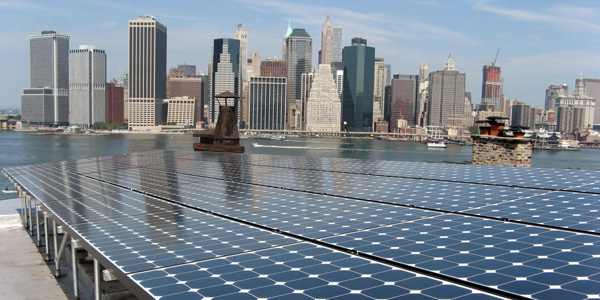By Michael Kuser
The New York Public Service Commission on Thursday enacted consumer protection standards for distributed energy resource suppliers.
The PSC’s order also created a manual of uniform business practices, the first rule of which stipulates that “a DER supplier shall obtain a customer’s consent to a sales agreement prior to billing a customer or enrolling a customer” in any program.

At the commission’s monthly meeting in Albany on Thursday, Ted Kelly, assistant counsel for the state’s Department of Public Safety, testified that “as DERs become an increasingly common and significant part of electric and gas service to customers, [the commission] has both the authority and the responsibility to ensure that customers participating in DER markets and programs understand the costs and benefits of their investments and are protected from confusion, fraud and abusive marketing.” (See Comprehensive DER Oversight Best, NYDPS Hears.)
DERs take a broad range of forms, Kelly said, “from rooftop solar panels to smart thermostats, to energy-efficient and demand-responsive industrial equipment, to bio-digesters making energy from farm waste, to community-scale distributed generation projects.”
The order requires residential customers be able to cancel a contract within three business days after its receipt without charge or penalty, and that the contract include essential information about pricing, cancellation rules, tax incentives, and details of the product or service provided.

PSC Chair John Rhodes said the order “provides a thoughtful and protective balance for New Yorkers and the timing is right. We are facing important and welcome growth in these resources, and we need to be in a position to provide protection for customers against untoward practices while pragmatically not burdening developers. I also find the initial focus on [community distributed generation] and mass market [distributed generation] makes all the sense in the world.”
Penalties for a violation of the rules can range from a warning up to a ban from participation in any programs or markets authorized by the commission.
Reining in ESCOs
The PSC also said Brooklyn-based energy service company (ESCO) MPower Energy could be barred from operating in New York following more than 100 customer allegations of deceptive sales and marketing practices.

After investigating complaints dating back to 2015, the commission said MPower must justify within 30 days why it should be allowed to continue operating in the state. The PSC also gave the firm seven days to show why it should be permitted to serve low-income customers, whom the commission said are frequently the victims of aggressive and misleading sales practices by ESCOs. (See NYPSC Limits ESCO Service, Sets New DER Compensation.)
The commission also determined that three ESCOs — Just Energy NY, National Fuel Resources and Zone One Energy — can continue serving low-income customers, while it denied waiver requests for four others: Agway Energy Services, Stream Energy, South Bay Energy and New Wave Energy.
The PSC in December 2016 banned most ESCOs from serving low-income customers but said it would consider waivers for any company that promised to offer bill savings or that could guarantee benefits to those customers. A state court earlier this year issued a temporary restraining order on the ESCO ban, which has been since lifted. (See Court Blocks NYPSC Order Barring ESCO Contracts.)
‘Yes’ to Community Choice Aggregation
The PSC approved the nonprofit Municipal Electric and Gas Alliance (MEGA) to implement a community choice aggregation (CCA) program for several Upstate New York municipalities.
Under the order, additional municipalities will be allowed to form such programs in the future, which “enable communities to take greater control of their energy choices through a transparent and competitive process driven by the consumers themselves,” Rhodes said.

Commissioner Diane Burman asked whether CCAs were subject to the just-issued rules for DER. Kelly said they would be if they included a DER component.
Utilities Prepped for Winter
The state’s major energy utilities expect to have adequate fuel supplies on hand for the coming winter, the commission heard.

“Each utility has a unique mix of assets to serve a unique mix of customers,” said Cynthia McCarran, PSC deputy director for natural gas and water. In her winter preparedness report, McCarran highlighted the efforts by some utilities, notably Consolidated Edison and New York State Electric and Gas, to focus on using demand response programs and so-called “non-pipes alternatives” to meet growing space and water heating needs.
“We anticipate energy consumers will benefit from adequate capacity and supply if we see a harsher-than-expected season,” Rhodes said.
The report said that natural gas bills in general are projected to be slightly higher this winter than historical averages and compared to last winter, which was warmer than normal. On the electric side, this winter’s commodity prices statewide are projected to be slightly higher than last winter, but significantly lower than the historical average.

Commission staff reported that major dual-fuel generation owners are continuing to follow the lessons learned from the harsh 2013-14 winter, including topping off fuel oil storage tanks ahead of the season, making firm arrangements for fuel oil replenishment, and ensuring that plant equipment has been prepared for winter operations.

“The electric utilities have continued to perform well in reducing the electric supply price volatility of their full service residential customers,” McCarran said. “The utilities have hedged approximately 70% of their estimated statewide full service residential energy needs to protect against unexpected electric market price swings that could occur this winter.”



